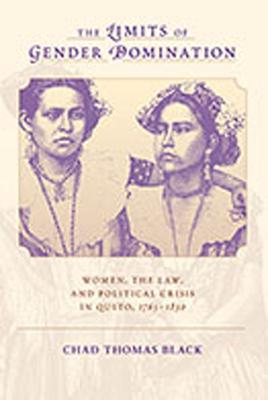Set against the backdrop of the tumultuous late colonial and early republican periods in Quito (1765-1830), this study examines women's legal, economic, and social status in order to gauge the relationship between the increasingly centralized power of the Bourbon kingship and the local operation of social authority. A gendered reading of judicial documents, legal literatures, and institution discourses reveals that Bourbon attempts to restrict women's access to legal resources were resisted by a traditional local legal culture based on practices of consultation, negotiation, judicial discretion, and contingency. This customary judicial practice, Black argues, played a fundamental role in limiting gender domination and prevented the full realization of a legal, economic, or social patriarchy in colonial Quito.
By documenting the progressive removal of limits to patriarchal power in the waning years of the Spanish Empire in Quito, this study traces the genealogy of legal patriarchy in Spanish America.
